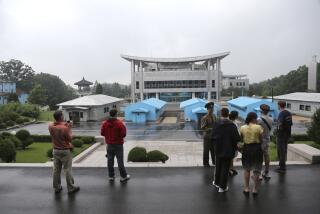Bush’s Mission in Korea
- Share via
President Bush’s planned five-hour visit to South Korea Monday will be the briefest stopover on his three-nation Asian trip and probably the noisiest as well. Radical students who have been conducting violent anti-government and anti-American demonstrations have promised to turn out in full force to protest Bush’s presence with attacks on government and U.S. facilities. President Roh Tae Woo has responded by warning that he intends to maintain law and order “at any cost.” There is a disturbing hint here that continued riots could provoke an extraordinary use of police power and perhaps even a reversion to oppressive measures, something the radicals would no doubt welcome but that South Korea’s developing democracy can do very nicely without.
Roh coincidentally completes his first year in office today with his popular support at an all-time high of 59%, according to a recent poll, and with public tolerance for what the radicals are up to sharply down since student-led demonstrations helped put Korea on the road to political pluralism and free elections in 1987. None of this necessarily makes it any easier for Roh and others in his government to be philosophical about the fire-bombing and rock-throwing that has been going on. Korea is still a society where order and social harmony are highly prized, especially by those in power who feel most threatened when traditional norms are challenged. But far greater than any danger the radicals pose is the danger of over-reaction in the face of their lawlessness. When all is said and done the radicals remain an unrepresentative minority that is at worst an irritant to the government but not, by any stretch of the imagination, a threat to the state or its security.
Balancing the expansion of freedom that Koreans want with the stability that’s needed to maintain the country’s remarkable economic revolution remains a major internal problem. The West took hundreds of years to refine the processes that, at least most of the time, make parliamentary democracy effective. South Korea, with the most limited experience in sharing power, building coalitions and negotiating political compromises, faces the need to do the same in just a few years or risk the possible re-emergence of repressive authoritarianism. The success of Korea’s experiment with democracy is by no means assured. Some, most obviously on the far left, are doing their best to force its collapse. Others, on the far right, would not mourn its failure. But after a year of divided government--Roh’s party holds only a minority of seats in the National Assembly--it seems clear that the overwhelming majority of Koreans want things to work. The strength of that desire may be the biggest thing democracy has going for it.
President Bush won’t have much time for detailed discussions during his brief visit to Korea, and the focus of his talks will probably be on U.S.-Korea relations. But he has been invited to address the National Assembly, and that gives him the chance to reaffirm American support for the steady growth of freedom in South Korea as well as the chance to gently remind his hosts that the essence of parliamentary democracy is the willingness and the courage to engage in give-and-take. The radicals in the streets aren’t likely to pay attention but that’s to be expected and besides, no one elected them to govern South Korea. The people who were elected will be listening, should Bush choose to deliver that useful message.
More to Read
Get the L.A. Times Politics newsletter
Deeply reported insights into legislation, politics and policy from Sacramento, Washington and beyond. In your inbox twice per week.
You may occasionally receive promotional content from the Los Angeles Times.










